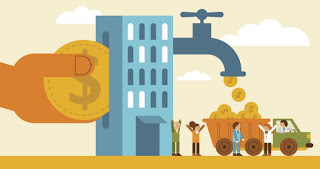Economists exaggerate the risks. We’ll never design a better welfare system if we don’t try it When I was very young my dad became very ill and couldn't work anymore and we ended up on benefit. My mum did used to do a part time job but had to give it up as she could not earn enough to look after us and also, she had to look after my dad and two children. The benefit was very low and my mum told years later that we were often hungry, so it was lucky that my friends and myself were always out scrumpying, stealing fruit from the orchards and getting blackberries from the woods.On the government benefit my mum was only allowed to do four hours work a week or we might start to bring in what low paid working families brought in and that wouldn't have been fair they told us. And I could
Topics:
Mike Norman considers the following as important:
This could be interesting, too:
Robert Vienneau writes Austrian Capital Theory And Triple-Switching In The Corn-Tractor Model
Mike Norman writes The Accursed Tariffs — NeilW
Mike Norman writes IRS has agreed to share migrants’ tax information with ICE
Mike Norman writes Trump’s “Liberation Day”: Another PR Gag, or Global Reorientation Turning Point? — Simplicius
Economists exaggerate the risks. We’ll never design a better welfare system if we don’t try it
When I was very young my dad became very ill and couldn't work anymore and we ended up on benefit. My mum did used to do a part time job but had to give it up as she could not earn enough to look after us and also, she had to look after my dad and two children. The benefit was very low and my mum told years later that we were often hungry, so it was lucky that my friends and myself were always out scrumpying, stealing fruit from the orchards and getting blackberries from the woods.
On the government benefit my mum was only allowed to do four hours work a week or we might start to bring in what low paid working families brought in and that wouldn't have been fair they told us. And I could only earn two pound a week so I did a paper-round right up to the age of 16 years old where my friends all got well paid Saturday jobs at the age of 14.
My mum was house proud and she wanted some nice furniture like other people had so she worked illegally for the 'Key-ring Man' for years making key-rings all day long on her sowing machine. My dad would glue them together and stick the medallion in ready for sowing. My mum told me not to tell anyone because people would report us and my mum and dad would be sent to prison. We closed the curtains a bit so no one could see my mum working. I felt like a criminal.
One day key-ring man said to my brother and myself that we could also glue the key-ring fobs together and he told us how much he would give us per hundred. So I spent all week gluing them together working my nuts off and when the end of the week came the key-ring man gave me a fiver, and I thought, what, a fiver for that work? Anyway, I only did it for a few weeks when I told him he could poke it and my brother did the same too, but my dad carried on gluing them. Anyway, we started to slowly get some nice furniture and one day the colour TV arrived and it was awesome, but our neighbours had had them for years.
Now, just imagine how different it could have been if we had had the Basic Income.
Kevin Vincent
**********

